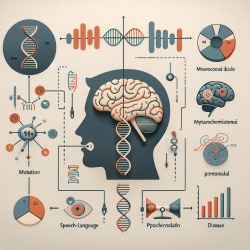Enriched environments have shown promising results in treating neurodevelopmental disorders (NDDs) such as Autism Spectrum Disorder (ASD), Attention Deficit Hyperactivity Disorder (ADHD), and Fragile X Syndrome (FXS). The research article "Enriched Environments as a Potential Treatment for Developmental Disorders: A Critical Assessment" provides valuable insights that can be implemented in online therapy services like those offered by TinyEYE. Here's how you can improve your practice by integrating these findings.
What Are Enriched Environments?
Enriched environments refer to settings that provide sensory, cognitive, and social stimulation. In animal studies, these environments have been shown to reduce emotional reactivity, ameliorate abnormal behaviors, and enhance cognitive functioning. Translating these findings to human settings, particularly for children with NDDs, involves creating interactive and stimulating environments that can foster development.
Key Findings from the Research
The research highlights several critical factors that need to be considered for the effective implementation of enriched environments:
- Operational Definition: Clearly define and standardize what constitutes an enriched environment across different studies and practices.
- Control Groups: Use control groups to better understand the specific impacts of enriched environments.
- Theoretical Framework: Develop a comprehensive framework to predict when and how enriched environments will benefit children with NDDs.
Practical Applications in Online Therapy
Online therapy platforms like TinyEYE can incorporate these findings to enhance their services. Here are some practical steps:
1. Create Interactive Sessions
Incorporate multisensory activities into your online sessions. Use tools that allow children to engage in tactile, auditory, and visual stimulation. For example:
- Interactive games that involve different senses
- Virtual reality experiences that simulate real-world environments
- Music and movement activities that encourage physical interaction
2. Foster Social Interaction
Encourage group sessions where children can interact with peers. Social interaction is a crucial component of enriched environments. Consider:
- Group therapy sessions
- Virtual playdates
- Collaborative projects that require teamwork
3. Tailor Individualized Programs
Every child is unique, and their response to enriched environments can vary. Tailor your programs to meet the specific needs of each child. Use assessments to identify areas that require more focus and adjust the activities accordingly.
4. Engage Parents and Caregivers
Parents and caregivers play a significant role in the success of enriched environments. Provide them with resources and training to create stimulating environments at home. This can include:
- Guidelines for sensory-rich activities
- Suggestions for interactive toys and games
- Strategies for encouraging social interaction
Encourage Further Research
While the current research provides a solid foundation, there is still much to learn about the long-term effects and best practices for implementing enriched environments. Encourage practitioners to stay updated with the latest research and to contribute to the field by sharing their findings and experiences.
Conclusion
Integrating enriched environments into online therapy can significantly benefit children with NDDs. By creating interactive, stimulating, and socially engaging sessions, practitioners can help children develop essential skills and improve their overall well-being.To read the original research paper, please follow this link:
Enriched Environments as a Potential Treatment for Developmental Disorders: A Critical Assessment.










